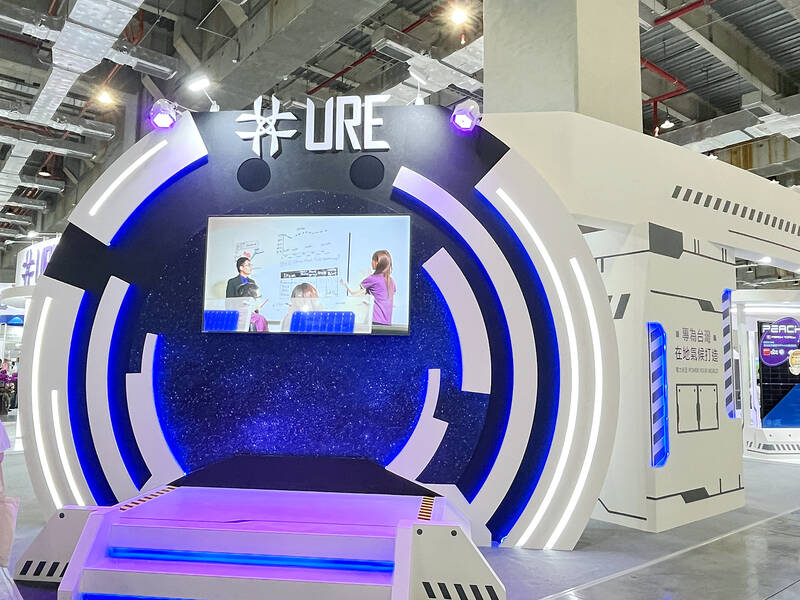Solar module and cell maker United Renewable Energy Co (URE, 聯合再生) plans to lay off more than 100 workers and retire outdated manufacturing equipment in an effort to improve operational efficiency.
The 10 percent job cuts come amid shrinking domestic demand for passivated-emitter-and-rear cells (PERC), the company said yesterday. It has a total of 1,095 employees.
The company plans to retire the production lines for less-advanced solar cells in Miaoli County’s Jhunan Township (竹南) and focus on new-generation TOPCon solar wafers.

Photo: Chang Hui-wen, Taipei Times
The PERC capacity made up about half of the company’s total capacity of 830 megawatts in Taiwan. The other half is for TOPCon solar wafers, for which the company started ramping up volume production in the fourth quarter last year, it said.
“We have submitted the plan to related authorities with an aim to strengthen the company’s operations,” URE deputy spokesperson Kris Chen (陳怡真) said by telephone.
URE shut down its solar cell factory in Thailand in the second half of last year after the US announced it was imposing anti-dumping tariffs on solar imports from four Southeast Asian nations, including Thailand.
The company reported a net loss of NT$179.06 million (US$5.98 million) in the first quarter of this year, compared with a loss of NT$283.12 million during the same period last year. It has been posting losses since the first quarter of 2023.
First-quarter revenue sank about 34 percent year-on-year to NT$978.86 million, attributable to sagging demand in Taiwan, which made up 56 percent of the company’s total revenue.
“URE aims to transform itself into an energy solution provider beyond a supplier of solar products and an operator of solar engineering, procurement and construction [EPC]. We will also provide solar power plant maintenance services and energy storage,” URE chief financial officer Pan Lay-lay (潘蕾蕾) told investors last week.
The company expects two new EPC projects to commence later this year — a fisheries solar project in Tainan and a ground-mount solar project in Taichung, Pan said.
The installed solar capacity totaling 20 megawatts would generate about NT$2 billion in revenue, she said.
Solar EPC project operators usually receive stable and predictable income based on 20-year power purchase agreements as they are guaranteed to sell the generated electricity at a fixed price.
URE plans to launch its first solar energy storage and management solutions for enterprises to address the widening gap between peak and off-peak electricity rates.

IN THE AIR: While most companies said they were committed to North American operations, some added that production and costs would depend on the outcome of a US trade probe Leading local contract electronics makers Wistron Corp (緯創), Quanta Computer Inc (廣達), Inventec Corp (英業達) and Compal Electronics Inc (仁寶) are to maintain their North American expansion plans, despite Washington’s 20 percent tariff on Taiwanese goods. Wistron said it has long maintained a presence in the US, while distributing production across Taiwan, North America, Southeast Asia and Europe. The company is in talks with customers to align capacity with their site preferences, a company official told the Taipei Times by telephone on Friday. The company is still in talks with clients over who would bear the tariff costs, with the outcome pending further

NEGOTIATIONS: Semiconductors play an outsized role in Taiwan’s industrial and economic development and are a major driver of the Taiwan-US trade imbalance With US President Donald Trump threatening to impose tariffs on semiconductors, Taiwan is expected to face a significant challenge, as information and communications technology (ICT) products account for more than 70 percent of its exports to the US, Chung-Hua Institution for Economic Research (CIER, 中華經濟研究院) president Lien Hsien-ming (連賢明) said on Friday. Compared with other countries, semiconductors play a disproportionately large role in Taiwan’s industrial and economic development, Lien said. As the sixth-largest contributor to the US trade deficit, Taiwan recorded a US$73.9 billion trade surplus with the US last year — up from US$47.8 billion in 2023 — driven by strong

A proposed 100 percent tariff on chip imports announced by US President Donald Trump could shift more of Taiwan’s semiconductor production overseas, a Taiwan Institute of Economic Research (TIER) researcher said yesterday. Trump’s tariff policy will accelerate the global semiconductor industry’s pace to establish roots in the US, leading to higher supply chain costs and ultimately raising prices of consumer electronics and creating uncertainty for future market demand, Arisa Liu (劉佩真) at the institute’s Taiwan Industry Economics Database said in a telephone interview. Trump’s move signals his intention to "restore the glory of the US semiconductor industry," Liu noted, saying that

AI: Softbank’s stake increases in Nvidia and TSMC reflect Masayoshi Son’s effort to gain a foothold in key nodes of the AI value chain, from chip design to data infrastructure Softbank Group Corp is building up stakes in Nvidia Corp and Taiwan Semiconductor Manufacturing Co (TSMC, 台積電), the latest reflection of founder Masayoshi Son’s focus on the tools and hardware underpinning artificial intelligence (AI). The Japanese technology investor raised its stake in Nvidia to about US$3 billion by the end of March, up from US$1 billion in the prior quarter, regulatory filings showed. It bought about US$330 million worth of TSMC shares and US$170 million in Oracle Corp, they showed. Softbank’s signature Vision Fund has also monetized almost US$2 billion of public and private assets in the first half of this year,